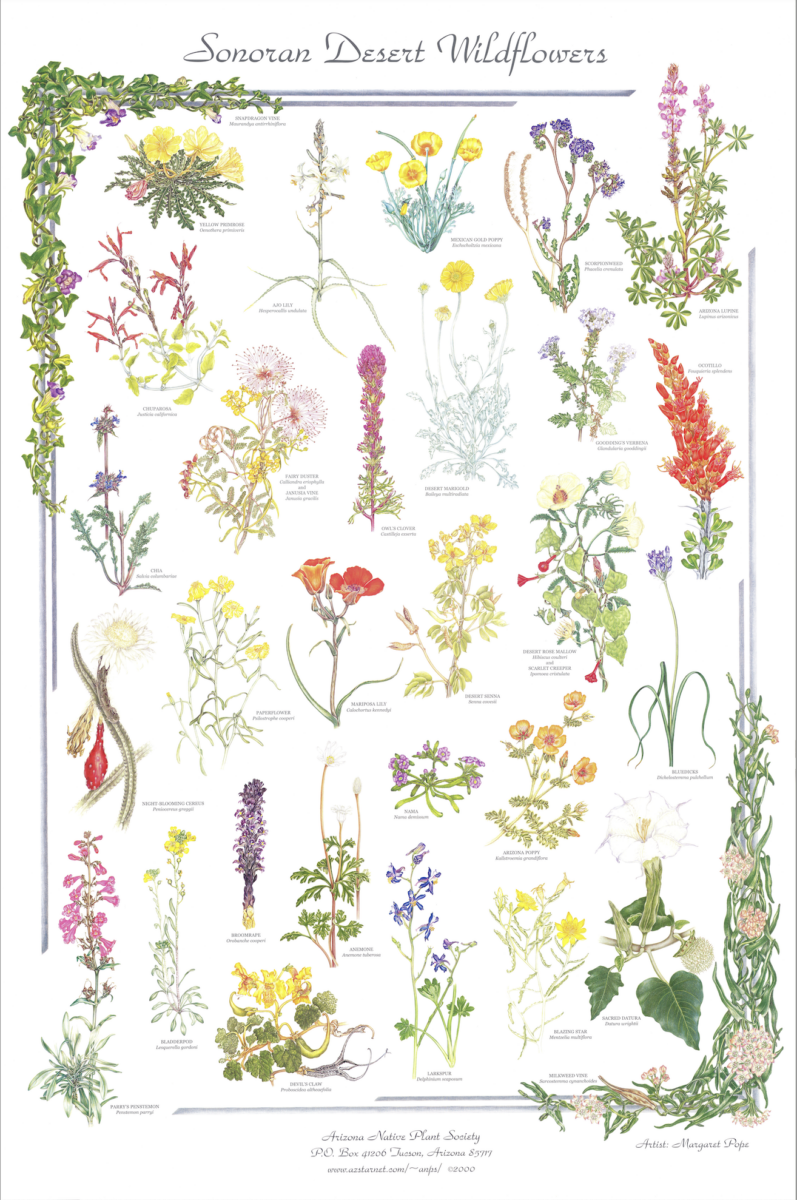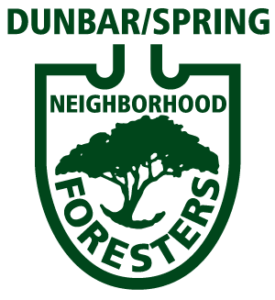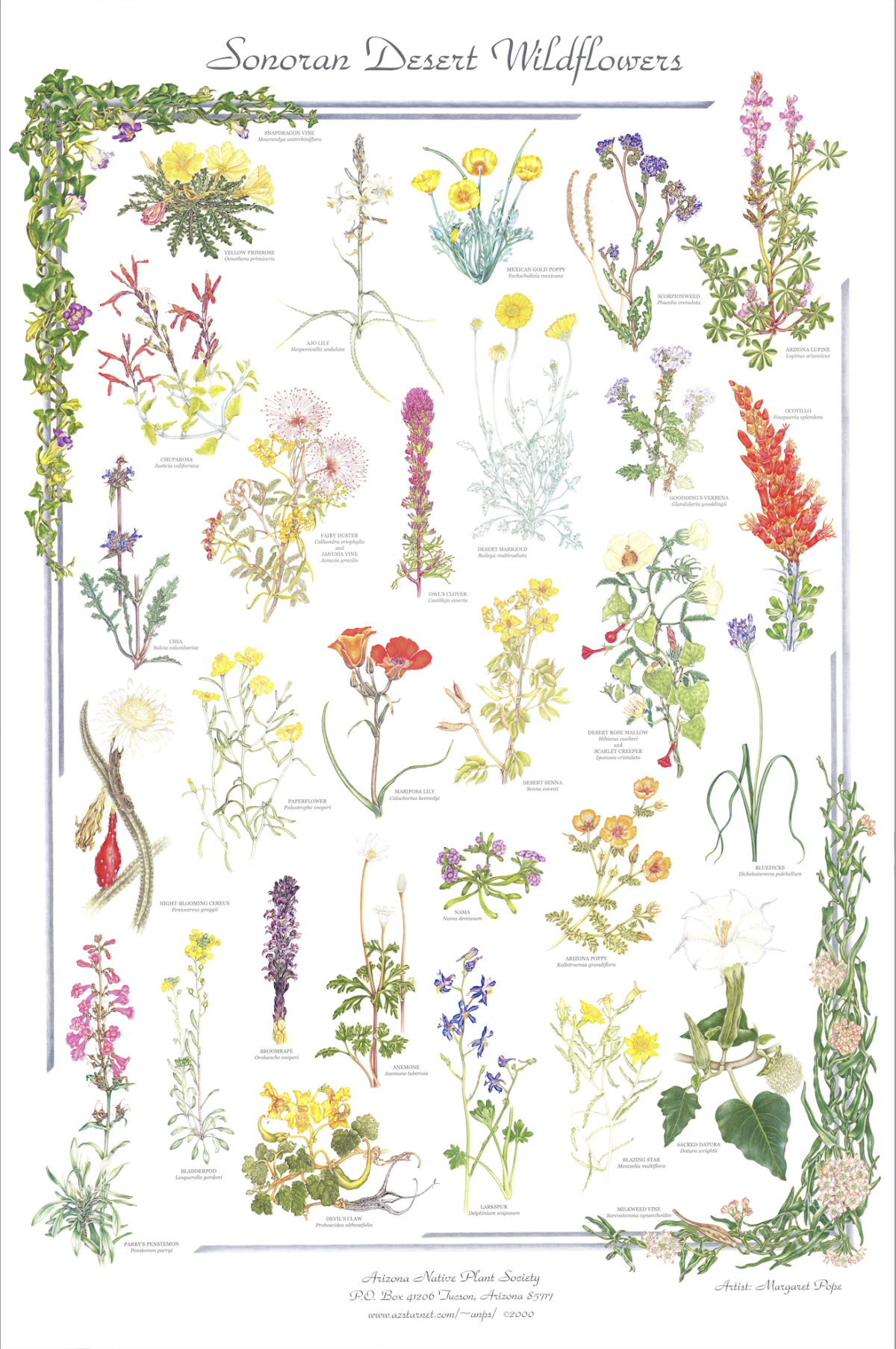
This is turning out to be a great native wildflower year out in the wild (beautiful at Picacho Peak Park right now) and here in the neighborhood where folks sowed native wildflower seed and have been weeding out non-native invasive weeds.
Learn to identify our native wildflowers so you can help them flourish!
We do plant identification at all our Neighborhood Foresters events.
For a couple of signs (with the image above) in our neighborhood identifying different native wildflowers, check out:
• the east-facing side of the community bulletin board on the SE corner of 9th Ave and University Blvd
• the south-facing side of the community bulletin board at Drutopia Nursery along the sidewalk on University Blvd west of 11th Ave.
Tips for removing non-native invasive plants
Weeding services
Tucson Audubon has a great service for hire whereby they treat invasive weeds with herbicide. This is most effective for treating invasive bermuda grass.
What is great about this service is the Tucson Audubon crew is well-trained and knowledgeable in plant identification so they spray the weeds you don’t want, while avoiding the desired native wildflowers and other plants we do want. They also do not use any more herbicide than is absolutely necessary.
Unlike Tucson Audubon, many other companies offering such a service lack adequate training and knowledge of their crews, resulting in disasters where most or ALL plants being killed (including the beneficial plants you don’t want harmed); and excessive use of the herbicide.
The Dunbar Spring Neighborhood Foresters use Tucson Audubon’s service with anyone participating in our annual rain and food forest plantings, in that we have the invasive weeds in the project area treated before we do any water harvesting or planting. That way desired plants flourish, not undesired invasives.
Additionally, the City of Tucson Storm to Shade program (with whom the Dunbar Spring Neighborhood Foresters has been coordinating) is now using Tucson Audubon to help with weed control in green infrastructure throughout the city.
You can hire Tucson Audubon to herbicide invasive weeds
Contact Tony Figueroa at Tucson Audubon
Email: TFigueroa@tucsonaudubon.org
Typical flat rate in central Tucson is $50 or $50 per hour, which includes herbicide and its application.
Save money by collaborating with your neighbors If we get a number of address wanting this service we can get the Tucson Audubon crew to come out and do all of them at once which saves everyone time and money as they won’t have to do multiple trips.
If you are in the Dunbar/Spring Neighborhood and are interested in being part of a community pool of folks getting this service, please contact Tony and/or Brad at NeighborhoodForesters@gmail.com.
If you are in a neighborhood other than Dunbar/Spring, then just contact Tony.
The more we remove seed sources of undesired invasive plants in our neighborhoods and watershed, and replace them with desired native plant seed sources—the healthier and more abundant our community will become.
Additional recommended contractors for hire (for pruning, weeding, etc)
Check out this page
Update on our annual rain and native food forest planting
The City of Tucson has just adopted a new online permitting platform which has been having a number of issues and delays, resulting in a backlog of permits waiting for review.
As a result, we are still awaiting approval for this year’s plantings in the Dunbar/Spring and West University neighborhoods.
Usually, we do our plantings in March, but this year they likely won’t happen until April.
We’ll post the planting dates and times on our Events page once all is approved and ready.
And we’ll start taking sign ups for next year’s planting earlier, likely in early November, to get a jump start on the permitting process.

